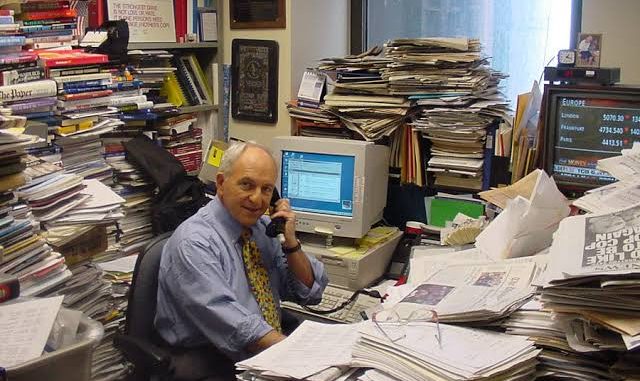
By Owen Russell
On the Upper West Side, in a bustling cafe filled with hungry senior citizens, I fidgeted. My notebook and phone prepped and ready. My waiter, thoroughly thronged with customers, grew more impatient as I said for the fourth time I would wait for my guest to order. I was early, and maybe a little nervous. I was waiting for legendary journalist, and Brooklyn College alumnus, Myron Kandel. Sitting at the booth, as requested by Kandel, I scanned the restaurant, paranoid that I had walked right past my interviewee. Had I Googled the wrong picture of him? Did I go to the wrong restaurant? Just as I was ready to dive into full panic mode, in walked a smiling older gentleman with a CNN jacket and a Brooklyn College cap. He came up to my table, motioning to his attire,“So you’d recognize me.”
The average observer may be inclined to question my stress levels, but Kandel has quite the intimidating resume. In his monolithic career, Kandel worked for The New York Times, Washington Star, New York Law Review, and helped found CNN. He spent 25 years on television. He worked overseas as a foreign correspondent. He even interviewed President Jimmy Carter in the back of a limousine. And now here we were, sharing breakfast.
Kandel, a Brooklyn native, cut his teeth as a reporter while attending Erasmus Hall High School in Flatbush. Kandel spent his early years covering sports, both in high school and eventually for The Vanguard while attending Brooklyn College. While in high school and college, Kandel learned valuable lessons in independence.
After being “fired” from his high school paper, Kandel printed his own publication and shared it with the students. Despite not being the more popular paper, Kandel was still proud. “I felt vindicated by doing it,” he told The Vanguard. Coincidentally, Kandel would experience a similar incident while at BC.
The current iteration of The Vanguard takes its namesake from the paper Kandel worked for in the late 1940s to early 1950s. Kandel and company were shut down by Harry Gideonese, the “authoritarian” college president. After being bounced, The Vanguard staff formed Draugnav, an off-campus paper determined to deliver top-tier reporting despite their lack of funding. Eventually, the effort became too arduous for the group of students, but Kandel cherishes the time he spent on The Vanguard.
In fact, Kandel and a few of The Vanguard’s surviving members still gather regularly. “They all say that The Vanguard experience and its struggle against unjust authority helped shape their lives to this day,” Kandel wrote in a piece he shared with The Vanguard. Sitting with Kandel, that impact became obvious.
Despite retiring in 2005, and turning 93 last month, Kandel is a journalist at heart. While enjoying a hefty plate of pancakes, Kandel asked plenty of questions. He was curious about The Vanguard, and how it was being run (I said all good things I promise). He wanted to know about me before I got the chance to know about him. He even made sure to lend a few helpful suggestions on the shape of this article (no pressure).
…
It would be unfair to try and do justice to Kandel’s impeccable career in the limited space I have available. For over half a century Kandel committed himself to quality journalism through hard work, and a little bit of luck. He shared with me a memoir he’s been toying around with. In the selections he shared, he credits his success to “serendipity.” I’d argue he wasn’t giving himself enough credit. As his time at Brooklyn College demonstrates, Kandel persevered. He was thrown a curveball, but him and the rest of The Vanguard adjusted. If the public ever gets a chance to read Kandel’s memoir, they’ll see that the same holds true throughout his career.
…
As our conversation continued, and our plates became empty, my initial intimidation faded. We laughed about the time he politely told off Rupert Murdoch, the billionaire media mogul who owns News Corp. He shared with me his love for pancakes, which he only eats at restaurants now. And as we finished our meal, we waited a little longer so he could order matzo ball soup for his wife Thelma; they were college sweethearts.
Initially, I had wanted this to be a chat between two sports editors, discussing how the job has changed, similarities and all that hoopla. But Kandel only spent a short time as sports editor, so we focused on the fun stuff instead. While it may not be the article I envisioned, I learned from Kandel that sometimes you have to pivot.
